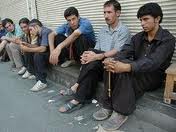 0615 GMT: We begin with a profile from an Iran-based "Business Correspondent" for Tehran Bureau:
0615 GMT: We begin with a profile from an Iran-based "Business Correspondent" for Tehran Bureau:
On Monday, November 26, the Iranian Customs Administration announced that it would not permit the release of cargo with imported goods financed through the currency free market as of November 20. That may look a like a typographical error; in fact, it was a retroactive edict with severe consequences for Iranian business owners if it were carried out.
Importers who paid for their goods with hard currency acquired outside the authorized banking system would not be permitted to clear customs -- even if the payments had been made up to six days before the rule was announced. Asadollah Asgaroladi, chair of the Iran-China Chamber of Commerce, called the decision "illegal" and predicted that it would cause significant damage.
The following day, Customs Administration chief Abbas Memarnejad told reporters that the clearing process would continue, but that merchants must announce the sources of their hard currency. In an apologetic tone, he said that the edict had been drafted by the Ministry of Commerce rather than by his own agency. As of publication time, the Ministry of Commerce has yet to issue a statement on the matter.
This episode is but the latest example of government meddling in the economy that has exacerbated uncertainty throughout the country's business community, already deeply unsettled by the international sanctions regimen and the collapse of the rial's open-market exchange value.
Another recent example of government intervention has had much greater impact: in an effort both to increase the domestic supply of essential goods and to prevent the reexport of imported items in ways that exploit state-subsidized currency exchanges, the Iranian government created a black list of commodities not to be exported. The list was drawn up too slowly to stop manipulators who had already reaped huge profits via reexportation. However, it has caused great hardship among domestic producers who were hoping to earn much needed hard currency through legitimate export activities.
Businessman like Ali Reza, who works in the information technology industry, find it impossible to make any sort of plans under these circumstances. "To me, it seems the government officials wake up every morning with a new idea and that idea affects my dealing right away," he says.
The Correspondent notes the significant admission by the Central Bank that Iranian oil exports are down by 40% this year --- with only a small offset from a 12% rise in other exports. --- a doubling of imports of natural gas and petroleum products.
The article concludes with businessman Ali Reza's surrender, "It is too late. We will never come back from this."
Posted via email from lissping
No comments:
Post a Comment
Note: only a member of this blog may post a comment.